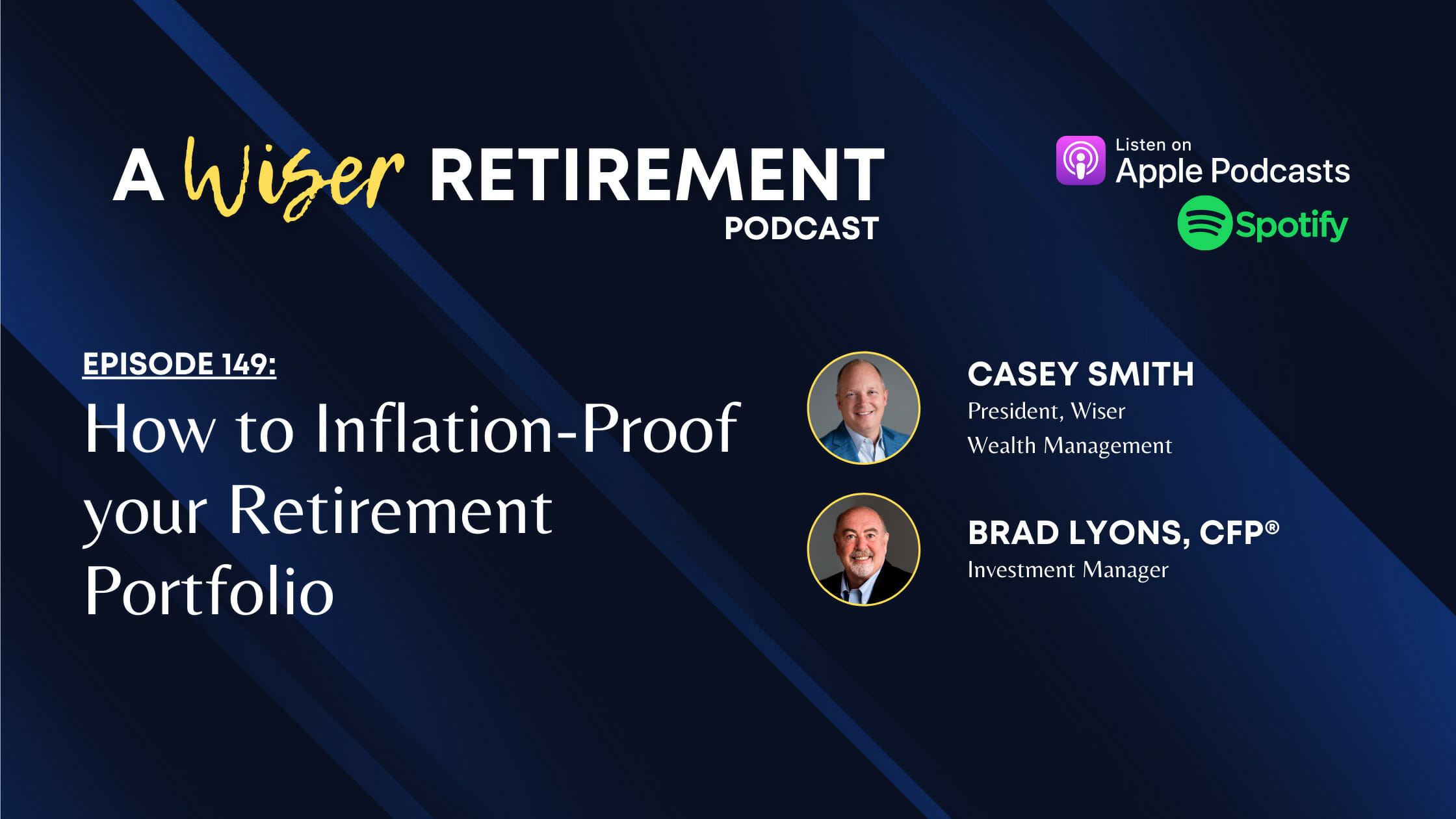
How to inflation-proof your retirement portfolio?
On this episode of A Wiser Retirement Podcast, Casey Smith and Brad Lyons, CFP® talk about some of the reasons for high inflation, and how to inflation-proof your retirement portfolio.
Listen on Apple Podcasts or watch on YouTube:
SUMMARY:
What got us to this high inflation period?
Inflation is purely a monetary phenomenon. As long as there’s been money, there’s been inflation. One of the causes of inflation is the supply of money. When COVID came along, the government increased the money reserve. That provided a stimulus for some businesses and individuals to keep going during the economic shutdown. The increase in money reserve provided an artificial cash flow. Then, in 2021 when COVID restrictions started to ease, people wanted to spend the extra cash they’d saved in the year prior. However, the supply was still low as a consequence of a significant decrease in the workforce, among other factors. This is the classic example of too many dollars chasing too few products. In fact, for any major decision, there are always unintended consequences. These were only some of the unintended consequences of many decisions made during COVID times.
Looking back, what could’ve been the perfect investment in pandemic times?
As the COVID virus started to subside towards the end of 2021, investors began to try to understand what the short-term and long-term effects on the economy would be. As well as, look for opportunities for the best investments.
Gold
In a high-inflation scenario, it is commonly known that gold is a good investment. However, this is not the case today. Gold is the go-to currency in the event of catastrophic periods. Even though COVID days seemed pretty catastrophic at the time, as we came out of it, we could see that the world actually didn’t come to an end. Then, because inflation was so high, the government decided to raise interest rates to try to offset it. Consequently, the dollar got stronger and became the currency that people wanted to invest back in. So, gold ended up not regaining the popularity, some would’ve expected. If there was a time when “cash was trash”, these are definitely times when “cash is king” again.
Stocks
In 2020 growth stocks did better than value stocks, in 2022 that turned around and value stocks did better than growth stocks. However, historically stocks have done really well after the inflationary period is over.
Commodities
Commodity investments have done well in high-inflation periods. It’s safe to affirm that some commodities have done really well during the pandemic.
Real Estate
Real Estate was also highly inflated in the last couple of years. People who had real estate possessions and sold some during 2021 were able to make great profit. It is wise for high-net-worth individuals to hold ⅓ of their investments in real estate. The fact that real estate is not as easy to liquidate as stocks, for example, helps people have better behavior and hold those assets for longer periods of time.
Bonds
With the interest rates going from being so low to much higher rates, a good opportunity to invest in bonds was created. Allowing people to gain yield and eventually, capital gains, too.
2022 Investing Overview
The truth is that you can’t win by betting all of your coins in one investment stream. Diversification over long periods of time is the best medicine for inflation. It takes patience, but the reward always comes.
In conclusion, 2022 was clearly a terrible year from an investment standpoint, caused by a combination of distinct economic factors. The dramatic and sudden increase in interest rates, (basically, 4 percentage points in a year) caused much of the market destabilization. Nonetheless, as we slowly walk past this phase, we will be able to see that parts of it allowed for an even stronger economy.
Download our eBook on “Top Reasons Most Financial Plans Fail”
TIMESTAMPS:
0:00 Intro
1:40 What go us to this high-inflation period?
13:30 Looking back what could’ve been the perfect investment in pandemic times?
27:00 Conclusion
LINKS:
Learn more about Casey Smith, Brad Lyons, CFP®, and Missie Beach CFP®, CDFA®
CONNECT:
Twitter, Instagram, Facebook, LinkedIn, and YouTube.
Learn more about A Wiser Retirement podcast and access previous episodes.
Share This Story, Choose Your Platform!
Wiser Wealth Management, Inc (“Wiser Wealth”) is a registered investment adviser with the U.S. Securities and Exchange Commission (SEC). As a registered investment adviser, Wiser Wealth and its employees are subject to various rules, filings, and requirements. You can visit the SEC’s website here to obtain further information on our firm or investment adviser’s registration.
Wiser Wealth’s website provides general information regarding our business along with access to additional investment related information, various financial calculators, and external / third party links. Material presented on this website is believed to be from reliable sources and is meant for informational purposes only. Wiser Wealth does not endorse or accept responsibility for the content of any third-party website and is not affiliated with any third-party website or social media page. Wiser Wealth does not expressly or implicitly adopt or endorse any of the expressions, opinions or content posted by third party websites or on social media pages. While Wiser Wealth uses reasonable efforts to obtain information from sources it believes to be reliable, we make no representation that the information or opinions contained in our publications are accurate, reliable, or complete.
To the extent that you utilize any financial calculators or links in our website, you acknowledge and understand that the information provided to you should not be construed as personal investment advice from Wiser Wealth or any of its investment professionals. Advice provided by Wiser Wealth is given only within the context of our contractual agreement with the client. Wiser Wealth does not offer legal, accounting or tax advice. Consult your own attorney, accountant, and other professionals for these services.





